display Citroen DS3 2015 1.G Owner's Guide
[x] Cancel search | Manufacturer: CITROEN, Model Year: 2015, Model line: DS3, Model: Citroen DS3 2015 1.GPages: 415, PDF Size: 11.95 MB
Page 123 of 415

121
DS3_en_Chap04_conduite_ed01-2015
F Turn thumb wheel 1 to the "LIMIT"
position: the speed limiter mode is
s
elected but is not switched on (PAUSE).
You
do not have to switch the speed limiter on
i
n order to set the speed.
F
S
et the speed value by pressing button 2
or 3
(e.g.: 55 mph (90 km/h)).
Programming
You can then change the programmed speed using buttons 2 and 3:
- b y + or - 1 mph (km/h) = short press,
-
b
y + or - 5 mph (km/h) = long press,
-
i
n steps of + or - 5 mph (km/h) = maintained press.
F
S
witch the speed limiter on by pressing button 4.
F
S
witch the speed limiter off by pressing button 4:
the display
c
onfirms that it has been switched off (PAUSE).
F
S
witch the speed limiter back on by pressing button 4
ag
ain.
Exceeding the programmed speed
Pressing the accelerator pedal to exceed the programmed speed will not have any effect unless you press the pedal firmly past the point of resistance.
The
speed limiter is deactivated temporarily and the programmed speed,
w
hich is still displayed, flashes.
Returning
to the programmed speed, by means of intentional or unintentional
d
eceleration of the vehicle, automatically cancels the flashing of the
pro
grammed
s
peed. On a steep descent or in the event of
sharp
acceleration, the speed limiter w
ill not be able to prevent the vehicle
from
exceeding the programmed
s
peed.
To
avoid any risk of jamming of the
ped
als:
-
e
nsure that the mat is secured
c
o r r e c t l y,
-
d
o not fit one mat on top of another.
Leaving limiter mode
F Turn thumb wheel 1 to the "0" position: t
he speed limiter mode is deselected. The
d
isplay returns to the distance recorder.
Operating fault
In the event of a speed limiter fault, the speed is cleared resulting in flashing of the dashes.
Have
it checked by a CITROËN dealer or a
q
ualified
w
orkshop.
driving
Page 124 of 415

DS3_en_Chap04_conduite_ed01-2015
Cruise control
System which automatically maintains the speed of the vehicle at the value programmed
b
y the driver, without any action on the
accelerator
ped
al.
The cruise control is switched on
m
anually:
it r
equires a minimum vehicle speed of 25 mph
(
40 km/h), as well as the engagement of:
-
f
ourth gear on a manual gearbox,
-
s
econd gear on a or automatic or electronic
g
earbox, in sequential mode,
-
position A
on an electronic gearbox or
p
osition d on an automatic gearbox.
The cruise control is switched off
m
anually
o
r by pressing the brake or clutch pedal or on
t
riggering of the trajectory control systems for
s
afety reasons.
It
is possible to exceed the programmed speed
t
emporarily by pressing the accelerator pedal.
To
return to the programmed speed, simply
r
elease the accelerator pedal.
Switching
off the ignition cancels any
p
rogrammed speed value. The
controls of this system are grouped
t
ogether on stalk A.
1.
C
ruise control mode selection thumb wheel.
2.
V
alue decrease button.
3.
V
alue increase button.
4.
C
ruise control off/resume button.Steering mounted controls
The cruise control cannot, in any
circumstances, replace the need to r
espect speed limits, nor can it replace the
n
eed for vigilance on the part of the driver.The
programmed information is grouped
t
ogether in the instrument panel screen.
5.
C
ruise control off/resume indication.
6.
C
ruise control mode selection indication.
7.
P
rogrammed speed value.
displays in the instrument panel
Page 125 of 415

123
DS3_en_Chap04_conduite_ed01-2015
Programming
F Turn thumb wheel 1 to the "CRUISE"
position: the cruise control mode is
s
elected but is not switched on (PAUSE).
F
S
et the programmed speed by
a
ccelerating to the required speed, then
p
ress button 2 or 3 (e.g.: 70 mph
(110
km/h)).
You
can
then
change
the
programmed speed using buttons 2 and 3:
-
b
y
+
or
-
1
mph
(km/h)
= short press,
-
b
y
+
or
-
5
mph
(km/h)
= long press,
-
i
n
steps
of
+
or
-
5
mph (km/h) = maintained press.
F
S
witch
off
the
cruise
control by pressing button 4:
the screen
c
onfirms
that
it
has
been switched off (PAUSE).
F
S
witch
the
cruise
control back on by pressing button 4
ag
ain.
Exceeding the programmed speed
Intentional or unintentional exceeding of the programmed speed results in flashing of this speed in the screen.
Return
to the programmed speed, by means of intentional or unintentional
d
eceleration of the vehicle, automatically cancels the flashing of the speed.
Leaving cruise control mode
F Turn thumb wheel 1 to the "0" position: the cruise control mode is d
eselected. The display returns to the distance recorder.
Operating fault
In the event of a cruise control malfunction, the speed is cleared resulting in flashing of the
d
ashes. Have it checked by a CITROËN dealer
o
r a qualified workshop.
When the cruise control is switched on,
be
careful if you maintain the pressure
o
n one of the programmed speed
c
hanging buttons: this may result in a
v
ery rapid change in the speed of your
v
ehicle.
Do not use the cruise control on
slippery
roads or in heavy traffic.
On a steep descent, the cruise control
will not be able to prevent the vehicle
from
exceeding the programmed
s
peed.
To
avoid any risk of jamming of the
ped
als:
-
e
nsure that the mat is secured
c
o r r e c t l y,
-
n
ever fit one mat on top of another.
driving
Page 133 of 415

131
DS3_en_Chap05_visibilite_ed01-2015
Model without AUTO lighting
Model with AUTO lighting
Manual controls
The lighting is controlled directly by the driver by means of the ring A and the stalk B.
Automatic
illumination of headlamps.
B.
S
talk for switching the headlamp beam:
p
ull the stalk to switch between dipped and
m
ain beam headlamps.
In
the lamps off and sidelamps modes,
t
he driver can switch on the main beam
h
eadlamps temporarily ("headlamp flash") by
m
aintaining a pull on the stalk.
A.
M
ain lighting mode selection ring: turn it
t
o position the symbol required facing the
ma
rk.Lighting
off / daytime running lamps.
Sidelamps
o
nly.
Dipped headlamps or main beam headlamps.
displays
Lighting of the corresponding indicator lamp on the instrument panel confirms the switching on
o
f the lighting selected.
The
instrument panel has permanent back-
lighting.
Illumination of the instrument panel is
t
herefore not linked to the exterior lighting.
Visibility
Page 135 of 415
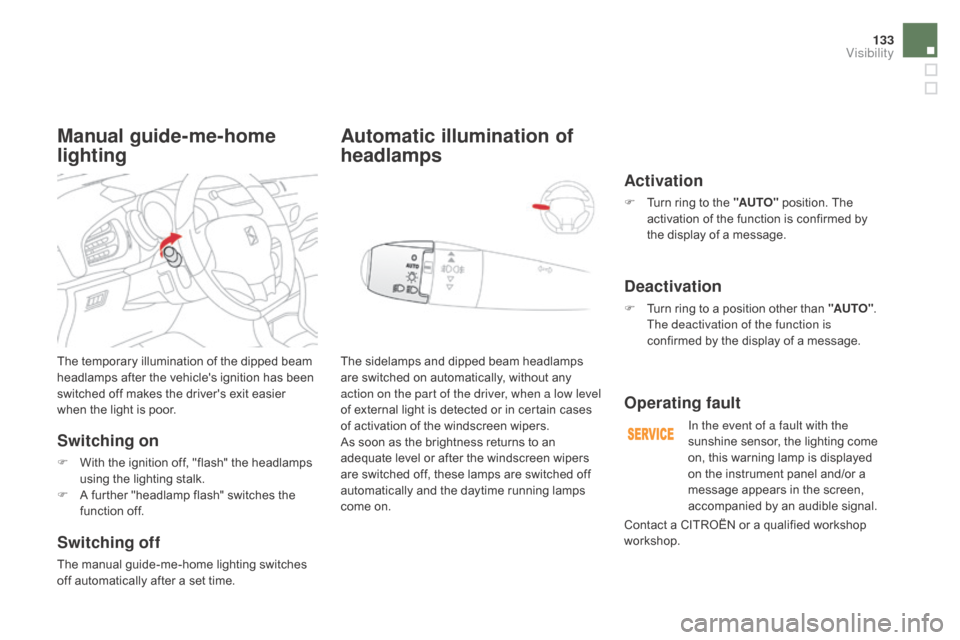
133
DS3_en_Chap05_visibilite_ed01-2015
The temporary illumination of the dipped beam headlamps after the vehicle's ignition has been
s
witched off makes the driver's exit easier
w
hen the light is poor.
Switching on
F With the ignition off, "flash" the headlamps u
sing the lighting stalk.
F
A
further "headlamp flash" switches the
f
unction off.
Switching off
The manual guide-me-home lighting switches off automatically after a set time.
Manual guide-me-home
lighting
The sidelamps and dipped beam headlamps are switched on automatically, without any
a
ction on the part of the driver, when a low level
of
external light is detected or in certain cases
o
f activation of the windscreen wipers.
As
soon as the brightness returns to an
a
dequate level or after the windscreen wipers
a
re switched off, these lamps are switched off
a
utomatically and the daytime running lamps
c
ome on.
Automatic illumination of
headlamps
Activation
F Turn ring to the "AUTO" position. The a
ctivation of the function is confirmed by
t
he display of a message.
deactivation
F Turn ring to a position other than "AUTO". T
he deactivation of the function is
confirmed
by the display of a message.
Operating fault
In the event of a fault with the
sunshine sensor, the lighting come
o
n, this warning lamp is displayed
o
n the instrument panel and/or a
m
essage appears in the screen,
a
ccompanied by an audible signal.
Contact
a
CITROËN or a qualified workshop
w
orkshop.
Visibility
Page 149 of 415
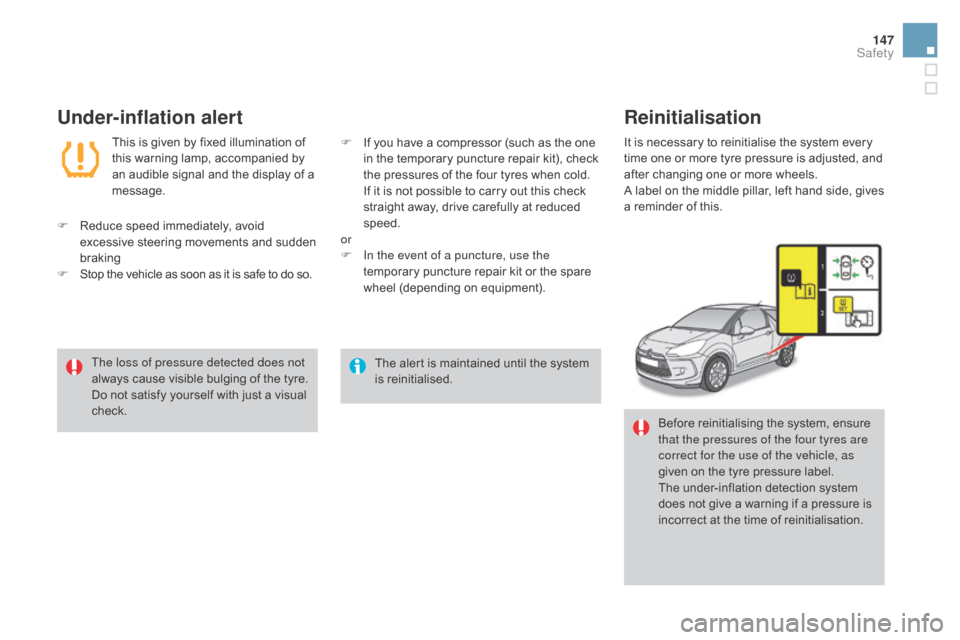
147
DS3_en_Chap06_securite_ed01-2015
The alert is maintained until the system is r einitialised.
The loss of pressure detected does not
always
cause
visible
bulging
of
the
tyre.
D
o
not
satisfy
yourself
with
just
a
visual
c
heck. Before
reinitialising the system, ensure
t
hat the pressures of the four tyres are
correct for the use of the vehicle, as
given
on the tyre pressure label.
The
under-inflation detection system
d
oes not give a warning if a pressure is
i
ncorrect at the time of reinitialisation.
Under-inflation alert
This is given by fixed illumination of this warning lamp, accompanied by
a
n audible signal and the display of a
m
essage.
F
R
educe speed immediately, avoid
e
xcessive steering movements and sudden
b
raking
F
S
top
the vehicle as soon as it is safe to do so.F
I f you have a compressor (such as the one
i
n the temporary puncture repair kit), check
t
he pressures of the four tyres when cold.
I
f it is not possible to carry out this check
s
traight away, drive carefully at reduced
s
peed.
or
F
I
n the event of a puncture, use the
temporary
puncture repair kit or the spare
w
heel (depending on equipment).
Reinitialisation
It is necessary to reinitialise the system every time one or more tyre pressure is adjusted, and
a
fter changing one or more wheels.
A
label on the middle pillar, left hand side, gives
a
reminder of this.
Safety
Page 150 of 415
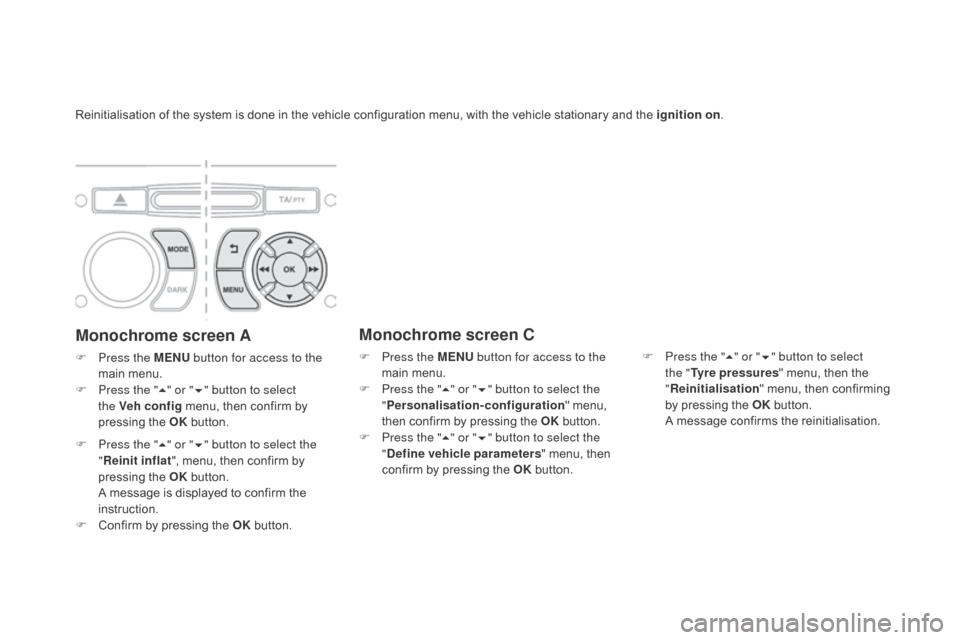
Reinitialisation of the system is done in the vehicle configuration menu, with the vehicle stationary and the ignition on.
Monochrome screen A
F Press the MEn U button for access to the
main menu.
F
P
ress the " 5" or " 6" button to select
the Veh conf ig
menu, then confirm by
p
ressing the OK
button.
F
P
ress the " 5" or " 6" button to select the
" Reinit inflat ",
menu, then confirm by
p
ressing the OK
button.
A
message is displayed to confirm the
in
struction.
F
C
onfirm by pressing the OK
button.
Monochrome screen C
F Press the MEnU button for access to the
main menu.
F
P
ress the " 5" or " 6" button to select the
" Personalisation-configuration "
menu,
t
hen confirm by pressing the OK
button.
F
P
ress the " 5" or " 6" button to select the
"
def
ine vehicle parameters "
menu, then
c
onfirm by pressing the OK
button.F
P ress the "
5" or " 6" button to select
the " Tyre pressures "
menu, then the
"R
einitialisation"
menu, then confirming
b
y pressing the OK
button.
A
message confirms the reinitialisation.
Page 151 of 415
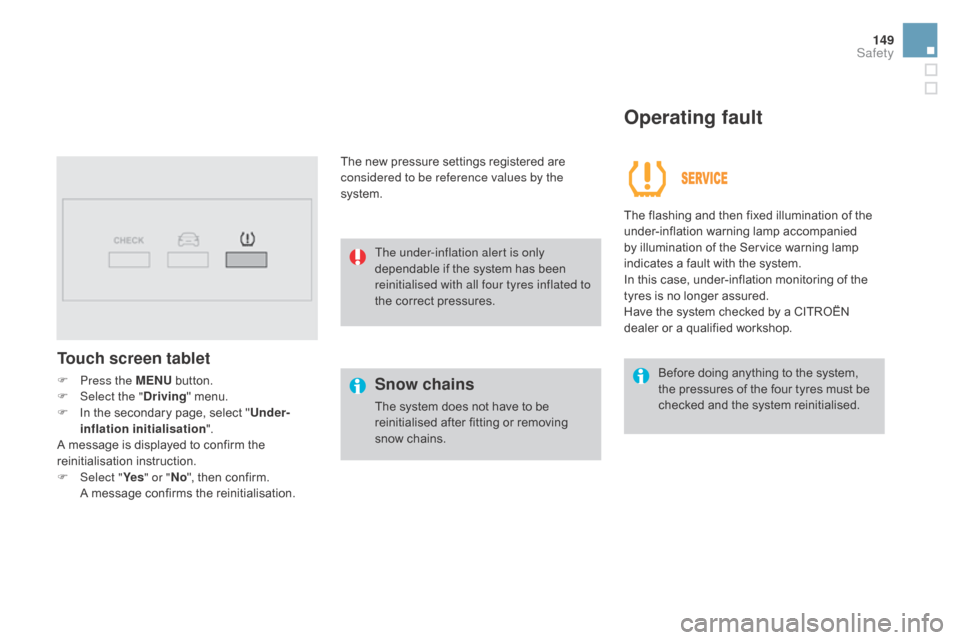
149
DS3_en_Chap06_securite_ed01-2015
Touch screen tablet
F Press the MEnU button.
F Sel ect the "dr iving"
menu.
F
I
n the secondary page, select "Under-
inflation initialisation ".
A
message is displayed to confirm the
r
einitialisation
i
nstruction.
F
Sel
ect "Ye s" or "
n
o",
then confirm.
A
message confirms the reinitialisation.The
new pressure settings registered are
c
onsidered to be reference values by the
system.Snow chains
The system does not have to be r einitialised after fitting or removing
sn
ow
c
hains. Before
doing anything to the system,
t
he pressures of the four tyres must be c
hecked and the system reinitialised.
The under-inflation alert is only
dependable
if the system has been
r
einitialised with all four tyres inflated to
the correct pressures.
Operating fault
The flashing and then fixed illumination of the u
nder-inflation w arning lam p a ccompanied b
y illumination of the Service warning lamp
i
ndicates a fault with the system.
In
this case, under-inflation monitoring of the
t
yres is no longer assured.
Have
the system checked by a CITROËN
d
ealer or a qualified workshop.
Safety
Page 156 of 415

Operation
When your vehicle is too close to or
approaches the vehicle ahead too quickly the
s
ystem automatically applies the brakes to
a
void a collision.
The
collision can be avoided automatically if the
d
ifference in speed between your vehicle and the
vehicle
ahead does not exceed 9 mph (15 km/h).
Above
this threshold, the system will do what
i
s possible to avoid or reduce the accident by
lowering
the speed of impact.
The
automatic braking may bring the vehicle to
a
complete stop if the situation requires it.
In this case, the vehicle is held stationary
temporarily
(for about 1.5 seconds) to allow
t
he driver to take back control by pressing the
b
rake
ped
al.
You are then alerted by the display of a
message.
The
brake lamps on your vehicle come on to
w
arn other road users.
After
an impact, the system is
a
utomatically put out of service: it no
lon
ger
ope
rates.
You
must go to a CITROËN dealer or a
q
ualified workshop to have the system
m
ade operational again.
During
automatic braking, the driver
c
an always obtain a higher rate of
d
eceleration than that controlled by the
system,
by pressing firmly on the brake
ped
al.
The
triggering of the system may cause
t
he engine to stall, unless the driver
d
epresses the clutch pedal quickly
e
nough during automatic braking.
deactivation
The system is deactivated in the vehicle configuration menu, accessible with the ignition on.
Its
state is memorised when the ignition is
s
witched off.
When the system is deactivated, a m essage is displayed every time the
i
gnition is switched on, to warn you.
Page 158 of 415
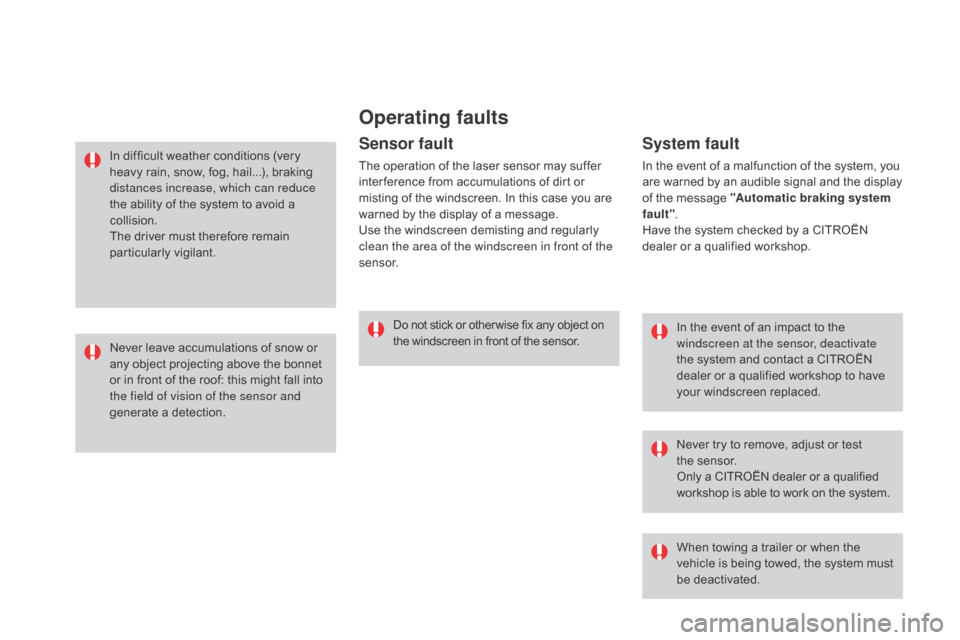
Operating faults
In the event of an impact to the windscreen at the sensor, deactivate
the
system and contact a CITROËN
d
ealer or a qualified workshop to have
y
our windscreen replaced.
Never
try to remove, adjust or test
t
he sensor.
Only
a CITROËN dealer or a qualified
w
orkshop is able to work on the system.
When
towing a trailer or when the
v
ehicle is being towed, the system must
b
e deactivated.Do not stick or other wise fix any object on the windscreen in front of the sensor.
Sensor fault
The operation of the laser sensor may suffer inter ference from accumulations of dirt or
m
isting of the windscreen. In this case you are
w
arned by the display of a message.
Use
the windscreen demisting and regularly
c
lean the area of the windscreen in front of the
sensor.
System fault
In the event of a malfunction of the system, you a re warned by an audible signal and the display
o
f the message "Automatic braking system
fault" .
Have
the system checked by a CITROËN
d
ealer or a qualified workshop.
In
difficult
weather
conditions
(very
h
eavy
rain,
snow,
fog,
hail...),
braking
d
istances increase, which can reduce
the
ability
of
the
system
to
avoid
a
c
ollision.
The
driver
must
therefore
remain
par
ticularly
v
igilant.
Never
leave
accumulations
of
snow
or
a
ny
object
projecting
above
the
bonnet
o
r
in
front
of
the
roof:
this
might
fall
into
t
he field of vision of the sensor and
generate
a
detection.